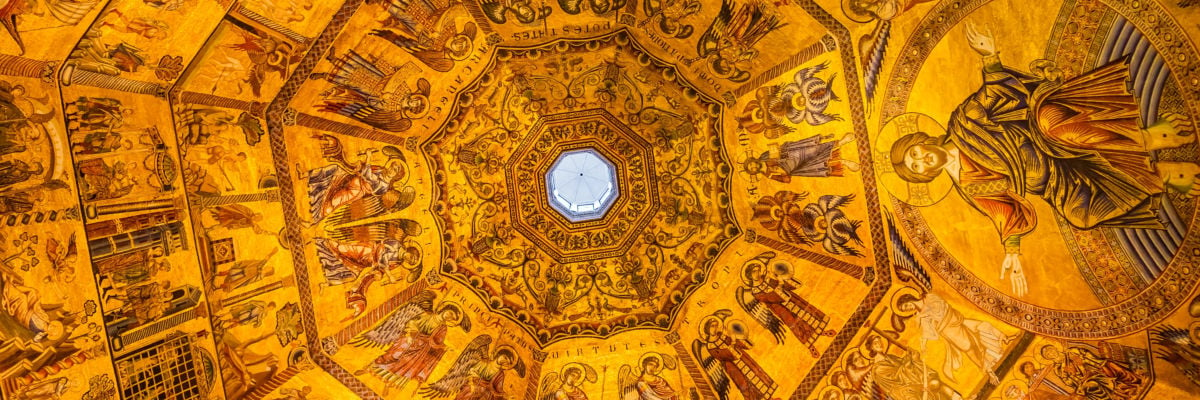
Sometimes, when we dabble in theology, we discover that some of our beliefs seemingly conflict with each other, challenging the pride we have in our beliefs. One example of a possible contradiction involves the intercession of the saints and their conformity to God’s will. You can find that one here.
The saints’ conformity to God’s will is not the only apparent obstacle to belief in the intercession of the saints. The saints’ inability to merit anything in heaven is another. St. Thomas Aquinas presents the objection this way:
Whosoever obtains something by prayer merits it in a sense. But the saints in heaven are not in the state of meriting. Therefore they cannot obtain anything for us from God by their prayers (Summa Theologiae Suppl. 72:3 obj 4).
The standard view in Catholic theology is that in order for a person to merit something, he must still be in this life, so departed human souls—including the saints—can no longer merit.
Here are some biblical passages that theologians have traditionally appealed to for support of this teaching:
- Hebrews 4:10: “For whoever enters God’s rest also ceases from his labors as God did from his.”
- Revelation 14:13: “Blessed are the dead who die in the Lord henceforth. ‘Blessed indeed,’ says the Spirit, ‘that they may rest from their labors, for their deeds follow them!’”
Now, St. Paul teaches in 1 Corinthians 3:8 that the wages we receive are proportioned to our labor. He writes, “He who plants and he who waters are equal, and each shall receive his wages according to his labor.”
So, if the Bible teaches that our labors cease when we die in the Lord, and our wages are proportioned to our labors, then it follows that our wages for our labors are fixed upon death. And since “wages” here traditionally has been viewed to include the gift of charity, we can conclude that our degree of charity is fixed upon death, and thus we can no longer merit because charity is the principle of merit.
There are a few different possible answers to this objection that Aquinas identifies.
First, as he writes, “although the saints are not in a state to merit for themselves, when once they are in heaven, they are in a state to merit for others” (ST Suppl. 72:2 ad 4). In other words, rather than their charity benefiting themselves, it’s beneficial for others.
A second possibility is that the saints in heaven can assist others by virtue of the merit they acquired while here on earth. Aquinas writes, “For while living they merited that their prayers should be heard after their death.”
This is consistent with what the Bible says about how the value of our charitable works remains with us as we enter heaven. Remember Revelation 14:13 above. The value of the good works of those who die in grace continues to exist as they exist in heaven.
Catholic teaching on the treasury of the Church is rooted in this biblical teaching. In paragraphs 1475-1477, the Catechism explains the Church’s treasury as follows:
In the communion of saints, “a perennial link of charity exists between the faithful who have already reached their heavenly home, those who are expiating their sins in purgatory and those who are still pilgrims on earth. Between them there is, too, an abundant exchange of all good things.” In this wonderful exchange, the holiness of one profits others, well beyond the harm that the sin of one could cause others. . . . We also call these spiritual goods of the communion of saints the Church’s treasury. . . . The “treasury of the Church” is the infinite value, which can never be exhausted, which Christ’s merits have before God. . . . This treasury includes as well the prayers and good works of the Blessed Virgin Mary. . . . In the treasury, too, are the prayers and good works of all the saints.
So Catholic teaching on the treasury of the Church provides us with an answer to this objection, and Aquinas’s thought runs parallel to it.
A third possible response is that the objection assumes that prayer obtains things only by way of merit. But, Aquinas argues, this is not true. Prayer can also obtain things by way of impetration, which simply means “by request or entreaty.”
Prayer is meritorious when there is a certain proportion between our prayer and that which we seek to obtain through the prayer, such that the thing we seek through the prayer is given as a reward. For example, Paul teaches in Romans 2:6-7 that eternal life will be given to those “who by patience in well-doing seek for glory and honor and immortality.” The reason why eternal life is a proportionate reward for our good works is that, according to Philippians 2:13, it is God who is at work in us, “both to will and to work for his good pleasure.” Or, as Paul puts it in Galatians 2:20, “It is no longer I who live, but Christ who lives in me.” The supernatural reward of heaven has a proper proportion to the supernatural value that God gives our good works by acting in and through us.
Obtaining something through prayer considered merely as a request (impetration), on the other hand, depends not on a proportion between the value of the request and that which is sought, but rather on the liberality of the person from whom we’re requesting something. In other words, whatever is sought by the request is not in any way due to the person who’s making the request. Whether the thing sought is obtained is entirely up to the person of whom the request is made.
So we can conclude with Aquinas that although the saints in heaven might not be able to obtain some good for us through meritorious prayer, they can still do so through prayers of impetration—prayers by way of request or entreaty.
The apparent conflict, therefore, between the intercession of the saints and their inability to merit in heaven is just that: apparent. A healthy Catholic pride in this belief can remain.



